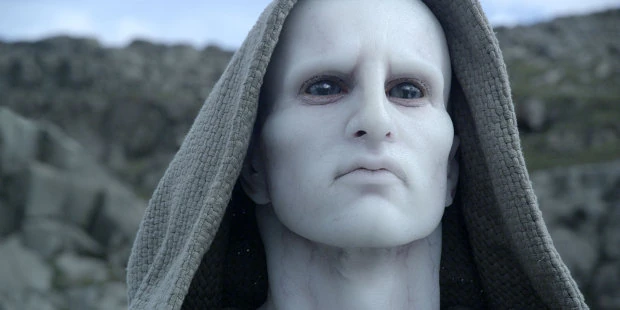Prepare to hold your breath because today, we’ll delve into a fascinating science fiction masterpiece: Prometheus. Are you ready to embark on a journey toward human existence and be swept away by endless questions?
The Opening Scene
The film begins with a character known as an “Engineer” standing by a river, gazing into the distance with an evident sense of purpose. However, we cannot immediately discern their intentions. The Engineer consumes a substance from a capsule, which severely deforms their body. As their body disintegrates, they fall into the river, dispersing DNA fragments that form the seeds of life within the water.
This scene is more significant than it initially appears, as it portrays the creation of humanity according to the film’s narrative. The tiny seeds symbolize our existence.
In philosophy and science, water often represents life. It is said that life on Earth originated from water following the Big Bang. Thus, the concept isn’t far removed from familiar narratives. But who are these Engineers? Why did they create us? If they are our ancestors, where are they now? Answers will unfold as the story progresses.
Archaeological Discoveries and Clues About the Engineers
Archaeological studies on Earth reveal traces of the Engineers. Various civilizations encountered them and depicted their images. When a group of scientists examines these depictions, they uncover something astonishing: each artifact represents a star. Connecting these symbols points to a galaxy resembling our own, complete with a sun and a planet suitable for life.
The Prometheus Mission and Mythological Connections
A wealthy and powerful man, Peter Weyland, assembles a team of skilled scientists for this mission. Sparing no expense, Weyland dispatches the spaceship Prometheus to uncover humanity’s greatest mystery.
The ship’s name is no coincidence. In Greek mythology, the Titan Prometheus sided with the gods, recognizing that the Titans would lose the great war. However, his allegiance wasn’t out of cowardice. Prometheus became one of the earliest rebels by defying the gods, stealing fire from Mount Olympus, and gifting it to humanity.
Similarly, Weyland sees himself as Prometheus. Yet, his goal is not as simple as fire—he seeks to steal eternal life from the gods.
Characters and Philosophical Explorations
Among the crew, Dr. Elizabeth Shaw and Charlie Holloway are particularly notable. They believe that even if the Engineers created humanity, a greater force created the Engineers. They join the mission to prove the existence of God and uncover the reasons for humanity’s creation.
Another central character is David, a highly advanced AI robot. While he lacks a soul or emotions, his fascination with understanding humanity becomes evident. He spends his time watching films and mimicking lines, shaping his principles and life purpose through these experiences.
Reaching the Planet and Initial Discoveries
Upon arriving at the planet, the crew encounters a massive structure—a settlement previously established by the Engineers. Inside, the atmosphere is tailored to sustain human life, and worm-like organisms roam the ground. These creatures initially appear harmless but soon evolve into significant threats.
The structure contains capsules filled with a black liquid capable of disintegrating the Engineer in the opening scene. This substance also transforms the worms into symbiotic creatures. Recognizing its potential, David takes one of these capsules aboard the ship for further study, remarking, “Big things have small beginnings.”
Philosophical Reflections on Humanity’s Existence
David grapples with humanity’s obsession with seeking its creator while failing to assign meaning or purpose to their creations—robots like him. If he were human, one might describe his reaction as anger, but his turmoil stems from contradictions and incomprehension.
This existential questioning highlights a real-world concern: the possibility that AI could one day deem humanity unworthy of control. Science fiction often explores this fear.
The Engineers’ True Purpose
As David investigates the black liquid, the crew faces deadly, worm-like creatures. A similar fate befell the Engineers. Despite their advanced abilities, the Engineers were not immortal. Dr. Shaw, who once romanticized them as humanity’s creators, struggles to reconcile this reality with their intent to destroy humanity.
Defiance of Gods and Humanity’s End
David awakens an Engineer from stasis as Peter Weyland seeks answers to humanity’s creation and rejection. The Engineer’s chilling reply reveals humanity’s violent nature:
“We gave you this emotion—hatred. We nurtured you, gave you fire, and watched as you repeatedly waged war and destroyed yourselves. At first, we tried to save your souls, but we left you to your fate. Your kind is barbaric and thrives on violence.”
Conclusion and Reflections
Prometheus transcends science fiction, offering profound reflections on existence, creation, and humanity. The Engineers and their enigmatic motives form the film’s philosophical core.
David’s journey enriches the narrative with questions about AI’s existential crises and its relationship with creators, mirroring humanity’s timeless struggles. The film also intertwines religious symbolism and philosophical themes, enhancing its depth.
Ultimately, Prometheus is a masterpiece that compels us to ponder the nature of creation, existence, and our place in the universe.
